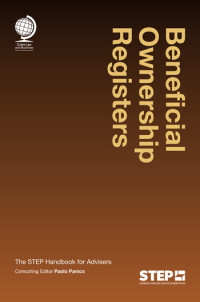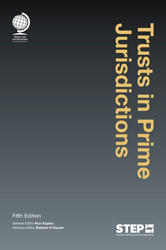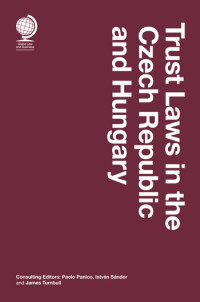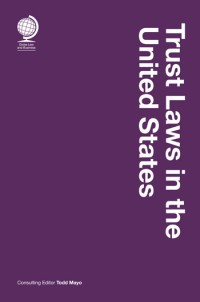
Consulting editor(s): Paolo Panico
Publication date: Aug 2021
Format: Hardback
Pages: 368
Price: £175.00
ISBN: 9781787424142
How our eBook platform works
How permanent access, multi-user eBooks work
Add to basket (UK and Europe)Add to basket (USA, rest of world)
Add to basket (UK and Europe)Add to basket (USA, rest of world)
Dr Panico and his colleagues present a masterful survey of this difficult subject. The discussion of its history and purposes introduces detailed accounts of its application in several EU countries, the United Kingdom and the United States. The publication will be much welcomed by practitioners dealing with the affairs of international clients.
,
Beneficial Ownership Registers provides detailed and up-to-date information on the reporting of ‘beneficial ownership’ of companies and trusts and sets the contemporary scene both internationally and on a country-by-country basis, with reference to European Union countries, the United Kingdom and the United States. Differences among EU member states exist although they are meant to implement the same EU directive, as the book convincingly shows, and a substantial difference also stands out between the EU and the US where the Corporate Transparency Act has approached the issue of reporting beneficial ownership of companies (though not of trusts, not a mean distinction) on a functional basis, rather than as a politically biased mission to be accomplished no matter what.
,
The concept of beneficial ownership has become increasingly relevant in the context of numerous measures to increase transparency and disclosure, in particular by way of publicly accessible registers, such that it now extends significantly beyond its original application to anti-money laundering and ‘know your client’ compliance requirements. It is therefore important that there is a renewed focus on the legal meaning of the term so as to ensure its correct legal interpretation and application in practice. This compendium of multi-jurisdictional legal analyses is a welcome contribution to that renewed focus.
,
This new book is the first to offer a comprehensive review of the rules relating to the reporting of beneficial ownership of companies and trusts in fifteen different EU jurisdictions, as well as in the UK, the Crown Dependencies, the USA and Liechtenstein. It also emphasises the variation of treatment relating to public access to information on beneficial ownership of companies and, importantly, of trusts. The reader can only echo Paolo Panico’s comment that an EU regulation harmonising some of the varied national requirements would be a welcome development. But until that happens this book will be an essential source of reference for any practitioner advising on international corporate and trust structures.
,
This volume is a valuable new addition to the Globe Law and STEP stable of co-publications. The topic of beneficial ownership has been much in the public eye in recent years, prompted partly by an international drive to create greater corporate disclosure to counter money-laundering and terrorist finance, and partly by a series of exposés in the form of the Panama, Paradise and Pandora papers. Now family office advisers, law firms and accountancy practices have at their fingertips an up-to-date digest and commentary on the state of affairs prevailing in some of the world’s key jurisdictions. If you are seeking a comprehensive guide to navigate you through the tricky waters of beneficial ownership, look no further.
,
Read more...Coming to the market shortly after the deadline for the transposition of AMLD 4 and 5 into national law, this book provides not only a useful snapshot of the various approaches adopted by a number of different (current or former) EEA states, including the UK, but also of the different approach of the Crown Dependencies and the USA. In addition, the two introductory chapters explain the background to the issues which each EEA state has had to consider, how they can reach different conclusions and, together with a number of the country chapters, identify some areas where changes may yet be required.
Trust & Trustees
,
Beneficial ownership registers were introduced in the European Union (EU) under the 4th and 5th Anti Money Laundering Directive, with the ultimate goal of promoting increased transparency in the financial markets. Nevertheless, public access to the beneficial ownership information of companies and other legal arrangements, such as trusts, raises significant issues in relation to each individual's fundamental right to privacy, and consequently many EU member states are still struggling to strike the right balance between transparency and privacy. As a result, the implementation of beneficial ownership registers has been delayed in many EU member states and different legislative choices have been made in the various jurisdictions. Since beneficial ownership registers do not only apply to entities incorporated or administered in an EU jurisdiction, but may also extend to foreign entities with some business connection to that jurisdiction, it is essential to master these differences.
This book, co-published with STEP, the world’s leading organisation for private wealth professionals, provides an in-depth analysis of the beneficial ownership registers legislation in a number of EU jurisdictions as well as in the UK, which pioneered it with the creation of its own ‘PSC Register’. It also looks at similar initiatives being experienced in some leading international financial centres as well as in the US.
It includes coverage of:
- The functioning of beneficial ownership registers in selected EU jurisdictions;
- The differences between the beneficial ownership registers for companies and those for trusts, which are maintained in many EU member states;
- Practical comparisons on the possibility for individual beneficial owners to apply for their personal information to be withheld from public access;
- The ways of complaint in case such an application is not accepted; and
- Special cases such as the treatment of an EU company controlled by a trust or a foundation.
The first to comprehensively approach this topic, this title will benefit private client advisers (lawyers, notaries, accountants) and family officers whose clients have business interests in the EU. The registration of the details of beneficial owners has become a new variable to be considered in any estate planning or asset protection exercise and more generally in any circumstance where a company or any other legal arrangement is created. It is therefore essential reading for anyone involved in any of these fields.


























